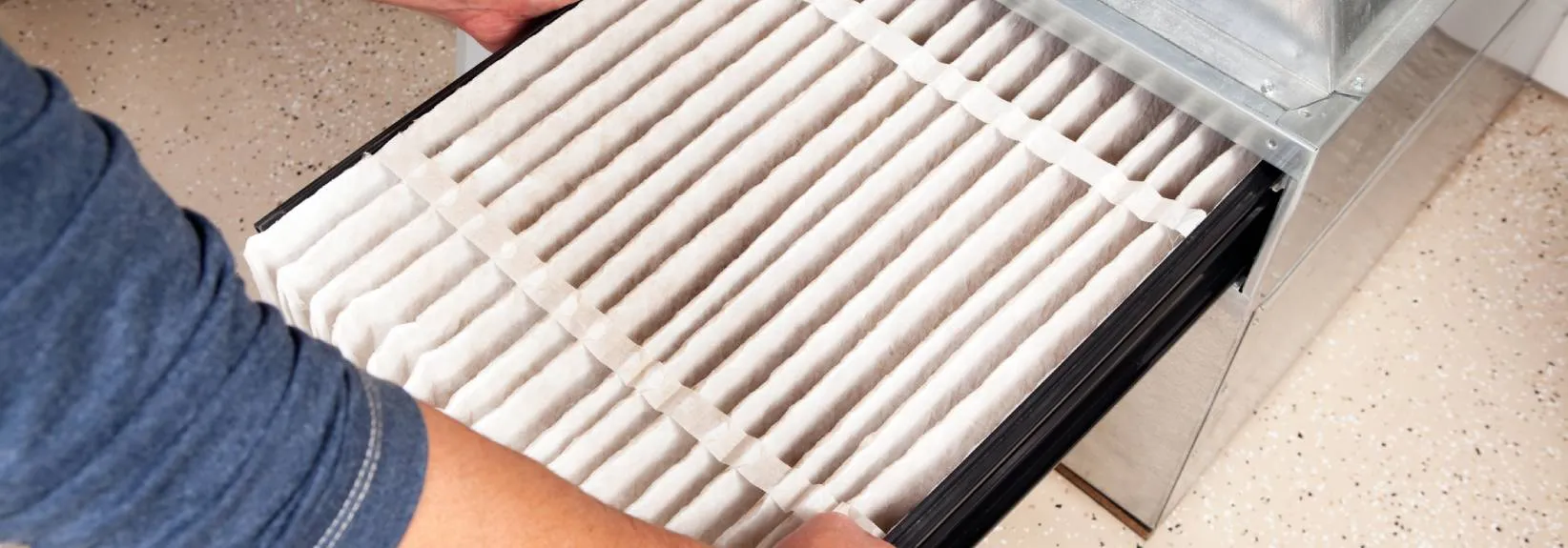AC Filters for People with Allergies
Many people are afflicted by allergies, and indoor air quality (IAQ) either makes it easier or more challenging to control symptoms. If your goal is to improve IAQ and limit the presence of allergens in your home, picking out the correct AC filter is imperative. Learn which air filter ratings are preferred for people with allergies and recommendations for finding the right air conditioner filter.
Allergens and Indoor Air Quality
Allergens are elements that trigger allergic reactions in some individuals. Common indoor allergens include:
- Dust mites
- Pet dander
- Mold spores
- Tobacco smoke
- Volatile organic compounds (VOCs)
- Bacteria and viruses
Common outdoor allergens include:
- Pollen
- Ragweed
- Wildfire smoke
- Smog and ozone
These allergens can be in the air or settle on surfaces, causing discomfort for allergy sufferers when inhaled, ingested or coming in contact with eyes. Keeping clean indoor air is a significant part of managing allergy symptoms, and using an effective AC filter to remove allergens is a key component.
Do Filters Help Reduce Allergy Symptoms?
Regular AC filters are not well equipped to cut down on allergy symptoms. Most are merely designed to stop dust particles, textile fibers and other large airborne substances from entering your HVAC system. A higher-end filter is needed to catch allergens and restrict them from circulating inside your home.
The most effective air conditioning system filters for allergies have a high minimum efficiency reporting value, or MERV rating, which denotes their effectiveness at capturing small particles on a scale of 1 to 20. For instance, a MERV 8 filter can capture pollen and mold spores, while a MERV 13 filter can capture smoke particles and large bacteria. An allergy AC filter with a high enough MERV rating minimizes airborne allergens for much-appreciated relief.
Know that MERV ratings of 17 to 20 describe high-efficiency particulate air (HEPA) filters designed to remove at least 99.97 percent of particles as little as 0.3 microns in size. While this makes them highly effective at removing allergens like dust, mold spores, bacteria and viruses from the air, most HEPA filters slow airflow so severely that they are not well-suited for residential properties. Seek advice from a professional before installing a HEPA filter to find out if your air conditioning system is compatible.
Are Allergy Filters Worth the Expense?
While allergy air filters for AC units are often more costly than standard filters, the advantages usually outweigh the costs for allergy sufferers. After all, paying for a high-quality AC filter to alleviate discomfort from allergies helps maintain superior indoor air quality and reduces allergy symptoms, strengthening overall health and well-being. In addition, installing a filter with a higher MERV rating can extend your HVAC system’s life by helping it stay clean and function effectively. Remember these long-term benefits of allergy filters when making the decision of whether to invest in one.
Recommendations for Choosing an AC Filter
Picking out the correct air filter is vital for good IAQ and a reduction in allergy symptoms. Here are some essential tips and methods to help you choose the perfect AC filter for allergies:
- Consider the MERV rating: Go with a filter with a MERV rating suited for your needs. For most allergy sufferers, a filter rated MERV 11 to 13 features the best balance between allergen capture and airflow efficiency.
- Choose the correct filter size: Air filters are made in various sizes, so select one that fits your HVAC system exactly. Incorrectly sized filters allow allergens to blow right on by, undermining the filter’s usefulness. Consult your HVAC system’s manual or reach out to a professional for help determining the right filter size.
- Try a pleated electrostatic filter: Pleated filters have more surface area for catching allergens and are typically more effective than flat panel filters. Those with electrostatic characteristics are best of all. The electrostatic charge helps these filters attract and capture allergens more efficiently than standard filters with similar designs and materials.
- Replace your filter routinely: Once you install a filter, don’t forget to change it often for the best possible performance. The general rule is to replace disposable filters every 30 to 90 days, but check the manufacturer’s recommendations for the recommended replacement interval.
- Contact a professional: If you’re uncertain about which filter is the most suitable for your needs or how to maintain your HVAC system properly, ask a licensed professional to help you make an informed decision.
Install a High-Quality Air Filtration System in Your Home
If you or someone in your household is afflicted with allergies, asthma or other respiratory problems, upgrading your HVAC system’s filter is one of the simplest things you can do to manage your symptoms. Enercare Winnipeg Supply can help you find and install the most appropriate air filtration system for your residence. For more information about our indoor air quality services, please call a Service Experts office near you today.



